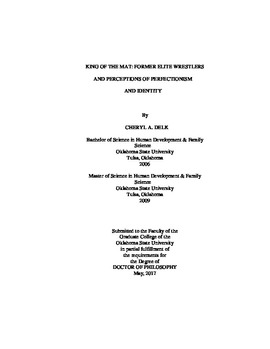| dc.contributor.advisor | Merten, Michael J. | |
| dc.contributor.author | Delk, Cheryl A. | |
| dc.date.accessioned | 2018-03-13T18:15:35Z | |
| dc.date.available | 2018-03-13T18:15:35Z | |
| dc.date.issued | 2017-05 | |
| dc.identifier.uri | https://hdl.handle.net/11244/54516 | |
| dc.description.abstract | Research on perfectionism and identity is vast and has a significant focus on athletic and academic performance along with links to positive and negative mental health. The majority of research is quantitative and data is collected from current athletes with very little known about the lived experiences of those with perfectionistic tendencies across the life span. Also, current research on identity is domain specific as well as collected from current athletes with minimal research on post participation. The perception of this life experience from former elite wrestlers is unique in that performance is not only at the individual level but also the team level and who do they perceive themselves to be now. These gaps are filled with this research, which involved a yearlong data collection of individual interviews with twenty participants. Their unique lived experiences about past and current goal setting; feelings on past and current success and failures; expectations of self and others; health and their lived experiences of identity is exposed. A phenomenological method was used to understand the essence of their lived and shared experiences of perfectionism and parental pressure resulting in themes of positive, adaptive self-oriented perfectionism, a mixed expression of adaptive and maladaptive other-oriented perfectionism. Also, results indicate the shared experience of a current wrestling identity as well as quality physical health. Results suggest employers, coaches and parents build an atmosphere of encouragement and support to enhance positive perfectionistic tendencies to decrease the likelihood of poor mental health outcomes especially for individuals who display socially-oriented perfectionism, maladaptive other-oriented perfectionism, and fear of failure. Additional research is needed to empirically verify the long term effects of individuals who display other oriented perfectionism that may influence the use of parental pressure and work relationships with co-workers. | |
| dc.format | application/pdf | |
| dc.language | en_US | |
| dc.rights | Copyright is held by the author who has granted the Oklahoma State University Library the non-exclusive right to share this material in its institutional repository. Contact Digital Library Services at lib-dls@okstate.edu or 405-744-9161 for the permission policy on the use, reproduction or distribution of this material. | |
| dc.title | King of the mat: Former elite wrestlers and perceptions of perfectionism and identity | |
| dc.contributor.committeeMember | Gardner, Brandt | |
| dc.contributor.committeeMember | Gallus, Kami | |
| dc.contributor.committeeMember | McGaha, Valerie | |
| osu.filename | Delk_okstate_0664D_15090.pdf | |
| osu.accesstype | Open Access | |
| dc.type.genre | Dissertation | |
| dc.type.material | Text | |
| dc.subject.keywords | wrestlers | |
| dc.subject.keywords | phenomenology | |
| dc.subject.keywords | perfectionism | |
| dc.subject.keywords | identity | |
| dc.subject.keywords | health | |
| thesis.degree.discipline | Human Development and Family Science | |
| thesis.degree.grantor | Oklahoma State University | |
